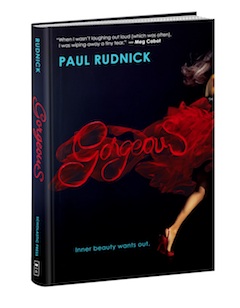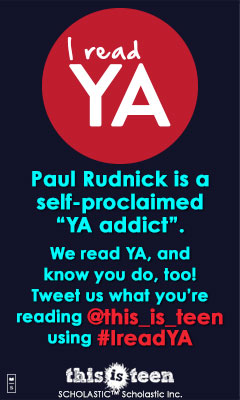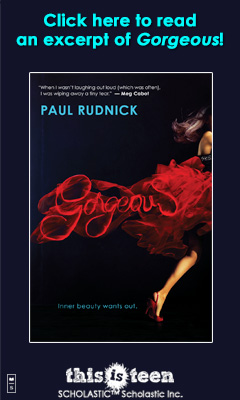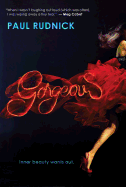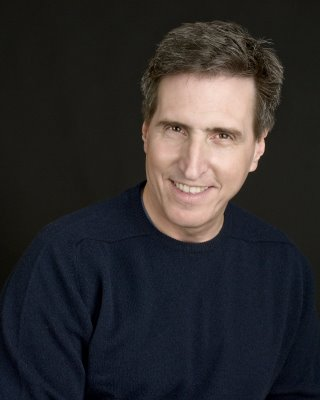Gorgeous
by Paul Rudnick
Paul Rudnick (I Shudder; the play I Hate Hamlet) makes a smashing YA debut with this novel about what truly makes someone beautiful, the doors that beauty opens and the responsibility that comes with opportunity.
On Becky Randle's 18th birthday, her 400-pound mother dies. "You have to promise me that--you won't be me," her mother had said before Becky left the house that morning. Her mother also added, "Something is going to happen to you, and it's going to be magical.... When the magic shows up--I want you to say yes."
Becky loved her mom. She'd loved watching celebrity TV shows with her, and reading magazines together. "No one could make the world seem sparkling and enchanted the way my mom could," Becky thinks. Three weeks after her mother's funeral, the sound of her mother's ringtone leads Becky to a phone number left inside a box marked "Tom Kelly"--the famous designer. It takes Becky a week to work up the courage to call the number, but when she does, a woman offers her a plane ticket to New York and $1,000. She asks her best friend, Rocher Bargemueller, what to do. "Becky," says Rocher (pronounced ro-SHARE; she's named for the chocolate), "we're checkout chicks, excuse me, Register Associates, at a supermarket [that's] probably gonna get shut down by the end of the month." Rocher offers a few more choice words. Becky leaves her trailer in East Trawley, Mo., and gets on a plane.
A chauffeur named Drake meets Becky at the airport and drives her to Kelly's "compound." When the 30-ish, athletic-looking Tom stands up to meet her, it was "like he wanted me to get a good look at all of him, as a dare." The way he looks at Becky, "I felt like a rabbit being eyeballed by either a scientist with a syringe, or a master chef with a cleaver." By the end of the second chapter, readers know that Tom Kelly plucked Roberta Randle, Becky's mother, out of a crowd of schoolgirls when she was 16 and built her into an icon of fashion and beauty. So what happened to her mother? Becky needs to find out what made her mother turn her back on that life and who she was, and why she insisted Becky make that vow. She knows that Tom Kelly has the answers. So when he promises Becky that if she wears three dresses that he will make for her--one red, one white, one black--and does everything he says, she will become "the most beautiful woman who has ever lived," she agrees to his terms.
Gorgeous is an examination of who the real Becky is--beauty gains her access to other worlds, but she's not at ease in them. When she's alone, she looks like Becky, the girl from the East Trawley trailer park. But when at least one other person is with her, she's Rebecca, "the most beautiful woman who has ever lived," on the cover of magazines, starring in films, visiting a burn unit with the U.K.'s Prince Gregory. One of the most charming aspects of the novel is that even when Becky is Rebecca, she still observes the glamour and glory through the eyes of the girl from the Show-Me State: "I wondered if this was fame.... I felt adored, for absolutely no reason, and erased, by all of that sound and light and attention." Rudnick allows us to walk in Becky's shoes, whether she's Becky or Rebecca.
Rudnick perfectly captures that tug of wanting to remain young and without responsibility while being on the cusp of adulthood. Then Kelly foists a new rule upon Becky: she must marry within a year, or lose her enchantment. "That's ridiculous and it's not much time and it's not fair," she yells. His response could be applied to much more than beauty: "There's a clock attached to every beautiful woman. From the second she comes into her own, she begins to decline, because she begins to age. Aging is every beautiful woman's kryptonite. And so, yes, it's ridiculous and no, you don't have much time and, of course, it's not fair. Those three statements are the essence of beauty."
But even as she races against the clock, Rebecca also gets to meet Jate Mallow, whom she's wanted to marry since she was 11, and star in a film with him (the media call them Jatecca), attend the U.K.'s Ascot races with royalty and aristocrats (Rudnick's commentary on hats is not to be missed), and be the bane of every aspiring model's existence ("for the very first time, standing next to her, I'm the uggabug," says one). But Becky is smart enough to ask Rocher to join her, to keep her grounded and honest.
Rudnick's easy dialogue and comic timing mask the serious themes he introduces, until suddenly there they are: raw and exposed and taking readers by surprise. It's easy to laugh at the wit of Becky's observation, "Mirrors are more dangerous than guns or cars or crystal meth, because they're cheap, readily available, and everyone's addicted," until one stops to consider her mother's morbid obesity as a consequence of being at the pinnacle of idolatry.
Rudnick delivers a timely novel that will draw in teens with its razor-sharp one-liners and observations about our instantaneous wireless social commentary, and keep them planted in these pages until they find out who will win: Becky or Rebecca? At the heart of this novel is the central dilemma of becoming an adult--that as much as it seems like someone else is in charge, ultimately, you determine your own destiny. --Jennifer M. Brown



